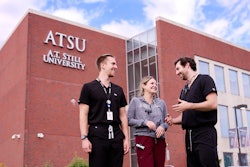This summer, 34-year-old Victoria Gray became the first person in the U.S. to have a gene editing therapy as treatment for sickle cell disease. “It’s a very big deal for me,” Gray said in a national media interview after learning the groundbreaking treatment was working. “It’s the change I’ve been waiting on my whole life.”
Gray, a Black wife and a mother of three from Mississippi, had been living with the complications of the inherited blood disorder that disproportionately affects African Americans for her entire life.
CRISPR is a new technique that involves cutting out a tiny piece of the mutation or defective gene that causes sickle cell disease in the hopes that the corrected gene will then work to make normal hemoglobin (a protein in red blood cells) instead of the sickle-shaped hemoglobin that gives the disease its name.
Dr. Emmanuelle Charpentier and Dr. Jennifer Doudna were awarded the Nobel Prize in chemistry in October for their work on the experimental gene therapy that made it possible for Gray to get the infusion. The technique has already “had a revolutionary impact on life sciences,” the Nobel Committee said, and for genetic diseases like sickle cell, it has the potential to “make the dream” of a cure “come true.”
But the hope for new treatments and a possible path to a cure for the mainly Black and Hispanic children and adults in the U.S. with sickle cell disease depends on their participation in clinical trials, says James G. Taylor, M.D., director of Howard University’s Center for Sickle Cell Disease in Washington, D.C. “Even if we get a cure today, we don’t have enough patients volunteering for clinical trial studies to implement it,” Taylor said at the center’s 2019 World Sickle Day conference.
Racism and a mistrust of the medical system dating back centuries remain an issue for many African Americans. Many cite the syphilis experiments the federal government conducted on about 600 Black men from Tuskegee, Alabama over a 40-year period starting in 1932. The men were promised free health care, but for decades, those with syphilis went untreated.
Today, as COVID-19 cases rage across the country and vaccine manufacturers race to the finish line, the level of trust from the Black community seems to have improved little. According to a September Pew Research Center report, Black people have been the most hesitant to volunteer for vaccine clinical trials and are the least likely to get a COVID-19 vaccine when one is available for use.














